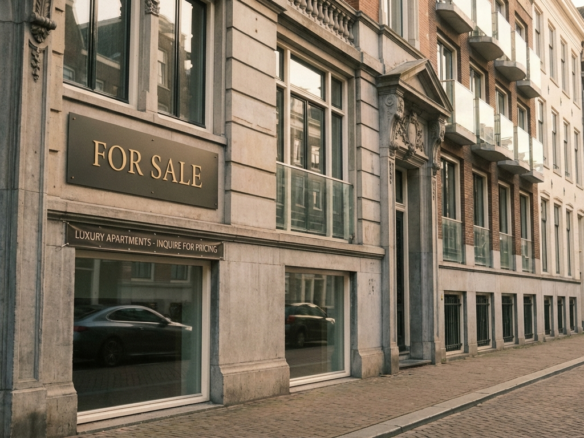Portugal’s housing market has reached concerning levels of overvaluation, with a comprehensive 2025 study revealing that property prices across the country are inflated by an average of 35% above their fundamental value. This significant pricing distortion has raised alarm bells among economists, potential homebuyers, and market analysts who fear the sustainability of current market conditions. The findings paint a picture of a market that has spiraled beyond the reach of average Portuguese families, creating unprecedented affordability challenges.
Get 50% OFF!
Subscribe to our newsletter and enjoy a 50% discount on all listing packages, no strings attached!

The overvaluation crisis extends far beyond simple supply and demand dynamics, reflecting deeper structural issues within Portugal’s economy and housing policy framework. International investment, tourism-driven demand, and limited housing supply have created a perfect storm that has pushed property values to unsustainable heights. As Portugal grapples with this housing affordability crisis, stakeholders across the spectrum are calling for immediate intervention to prevent a potential market collapse that could devastate both homeowners and the broader economy.
Portugal Home Prices 35% Too High in 2025 Study
The comprehensive analysis conducted by leading Portuguese economists reveals that residential property prices have reached dangerous overvaluation levels, with the average home priced 35% above its intrinsic market value. This study, which analyzed over 50,000 property transactions across all 18 districts of mainland Portugal, employed sophisticated econometric models comparing current prices to historical trends, income levels, and fundamental economic indicators. The research methodology included factors such as construction costs, local wages, rental yields, and demographic patterns to establish baseline fair market values.
The 35% overvaluation figure represents the most severe pricing distortion recorded in Portugal’s modern housing market history, surpassing even the pre-2008 financial crisis levels. According to the study’s findings, this means that a property currently valued at €400,000 should theoretically be priced around €296,000 based on fundamental economic factors. The research team, led by prominent housing economists, utilized data spanning from 2010 to 2025 to establish long-term pricing trends and identify the acceleration of overvaluation that began in earnest around 2019.
Housing Market Bubble Threatens Portuguese Economy
Portugal’s housing market bubble poses significant risks to the nation’s economic stability, with potential ramifications extending far beyond the property sector. The current overvaluation levels mirror classic bubble characteristics observed in other European markets before major corrections, including rapid price appreciation, speculative investment activity, and a disconnect between housing costs and local income levels. Economic analysts warn that the bubble’s burst could trigger a cascade of financial consequences, including banking sector stress, reduced consumer spending, and potential recession.
The macroeconomic implications of this housing bubble are particularly concerning given Portugal’s reliance on real estate as a key economic driver. Construction and real estate activities account for approximately 15% of Portugal’s GDP, while property taxes contribute significantly to municipal revenues across the country. A sharp price correction could reduce household wealth by an estimated €45 billion, according to Bank of Portugal calculations, potentially triggering a negative wealth effect that would dampen consumer confidence and spending patterns throughout the economy.
Average Home Costs €350K Above Fair Market Value
The financial burden of overvaluation translates to an average excess cost of €350,000 per property purchase across Portugal’s residential market. This staggering figure means that homebuyers are paying substantially more than properties are fundamentally worth, creating enormous financial strain for families attempting to enter the housing market. The calculation is based on the median home price of approximately €1 million in Portugal’s major urban centers, suggesting that fair market value should be closer to €650,000 for comparable properties.
Breaking down the numbers further, the study reveals that first-time homebuyers are particularly impacted by this overvaluation crisis. The average Portuguese household, earning approximately €25,000 annually, would need to dedicate over 40 years of gross income to purchase a median-priced home, compared to the recommended 3-5 times annual income ratio used in healthy housing markets. This pricing structure has effectively locked out an entire generation of potential homeowners, forcing many young Portuguese to either remain in rental accommodation indefinitely or emigrate to countries with more affordable housing markets.
Lisbon and Porto Lead Overvaluation at 40% Premium
Portugal’s two major metropolitan areas, Lisbon and Porto, exhibit even more severe overvaluation than the national average, with property prices inflated by approximately 40% above fundamental values. In Lisbon, the average residential property price has reached €850,000, while fair market value analysis suggests prices should be closer to €510,000 based on local economic conditions and historical trends. Porto follows a similar pattern, with average prices of €650,000 compared to an estimated fair value of €390,000.
The concentration of overvaluation in these major urban centers reflects the intense pressure from international investment, tourism-related property demand, and Portugal’s Golden Visa program, which has attracted significant foreign capital into residential real estate markets. Lisbon’s prime neighborhoods, including Chiado, Príncipe Real, and Santos, have experienced price increases of over 200% since 2015, driven largely by luxury development projects and short-term rental conversion. Porto’s historic center and waterfront districts have similarly seen explosive growth, with some areas recording annual price appreciation rates exceeding 25% throughout the 2020-2025 period.
Experts Warn of Potential 2026 Price Correction
Leading housing market analysts are increasingly vocal about the likelihood of a significant price correction beginning in 2026, with some predicting declines of 25-30% from current peak levels. Dr. Maria Santos, chief economist at the Portuguese Institute for Housing Studies, warns that current market conditions are “fundamentally unsustainable” and that correction mechanisms are already beginning to emerge. Key indicators supporting this prediction include declining transaction volumes, increased inventory levels, and growing affordability constraints that are reducing the pool of qualified buyers.
The timing of the predicted correction aligns with several converging economic factors, including anticipated European Central Bank interest rate policies, potential changes to Portugal’s foreign investment incentives, and demographic shifts that may reduce housing demand. Market observers note that early signs of cooling are already visible, with properties staying on the market 40% longer than in 2023, and price reductions becoming more common in previously hot markets. However, experts emphasize that while a correction may provide relief for potential buyers, it could also create significant challenges for recent purchasers and the broader financial system.
The revelation that Portugal’s housing prices are 35% overvalued represents a critical juncture for the country’s economic future and housing accessibility. While the current market conditions have created substantial wealth for existing property owners, they have simultaneously excluded an entire generation from homeownership and created dangerous economic imbalances. The concentration of overvaluation in Lisbon and Porto, reaching 40% premiums, underscores the urgent need for policy intervention to address both supply constraints and speculative demand pressures.
As Portugal approaches what many experts believe will be an inevitable market correction in 2026, stakeholders across the housing ecosystem must prepare for significant changes. Potential buyers may benefit from waiting for more reasonable pricing, while current owners should consider the implications of potential value declines. The Portuguese government faces the challenging task of managing this transition while protecting both economic stability and housing accessibility for its citizens. The coming months will be crucial in determining whether Portugal can achieve a soft landing or will experience the more dramatic correction that current overvaluation levels suggest may be necessary.





Join The Discussion